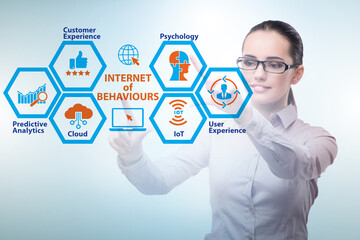Introduction to Internet of Behaviors (IOB)
Understanding IOB
The Internet of Behaviors (IOB) is an emerging concept that focuses on the collection, analysis, and utilization of data related to human behaviors and interactions. It involves leveraging digital technologies to understand and influence human behavior in various contexts, including consumer habits, healthcare practices, and social interactions.
Definition and Concept
IOB encompasses the integration of behavioral data from various sources, such as internet activity, social media interactions, and sensor data from Internet of Things (IoT) devices. By analyzing this data, organizations can gain insights into individual behaviors, preferences, and decision-making processes, enabling targeted interventions and personalized experiences.
Importance and Implications
The rise of IOB has significant implications for businesses, healthcare providers, and policymakers alike. By understanding consumer behaviors and preferences, organizations can tailor products and services to meet individual needs, improve customer satisfaction, and drive business growth. In healthcare, IOB enables proactive monitoring of patient health metrics, early detection of potential health risks, and personalized treatment recommendations, leading to better health outcomes and reduced healthcare costs.
Components of IOB
Key Components
IOB comprises two main components: data collection and behavior analysis.
Data Collection
Data collection involves gathering information from various sources, including online platforms, mobile apps, wearable devices, and IoT sensors. This data may include browsing history, social media interactions, location tracking, biometric data, and environmental variables. The proliferation of connected devices and digital technologies has facilitated the collection of vast amounts of data on human behaviors and activities.
Behavior Analysis
Behavior analysis entails processing and analyzing the collected data to uncover patterns, trends, and correlations related to human behaviors. Advanced analytics techniques, such as machine learning algorithms and predictive modeling, are used to extract actionable insights from the data and identify behavioral patterns that can inform decision-making and strategy development.

Applications of IOB
Practical Uses
IOB has diverse applications across various industries and sectors.
Consumer Behavior Analysis
In the retail sector, IOB enables retailers to analyze consumer behavior patterns, preferences, and purchasing habits to optimize marketing strategies, personalize product recommendations, and enhance the overall shopping experience. By leveraging data analytics and AI-driven insights, retailers can tailor promotional offers, discounts, and product assortments to meet individual customer needs and preferences, thereby increasing customer satisfaction and loyalty.
Healthcare Monitoring
In healthcare, IOB facilitates remote monitoring of patient health metrics, medication adherence, and treatment compliance through wearable devices, mobile health apps, and IoT sensors. By continuously monitoring patient behaviors and health indicators, healthcare providers can detect early signs of disease exacerbation, intervene proactively, and deliver personalized care plans to improve patient outcomes and reduce hospital readmissions.
Benefits and Challenges
Advantages of IOB
IOB offers several benefits, including:
Personalization and Customization: By analyzing individual behaviors and preferences, organizations can deliver personalized experiences, recommendations, and interventions tailored to meet specific needs and preferences.

Ethical and Privacy Concerns
Despite its potential benefits, IOB raises ethical and privacy concerns regarding data collection, usage, and consent.
Transparency and Consent: Organizations must ensure transparency in data collection practices and obtain informed consent from individuals before collecting and analyzing their behavioral data. Clear communication and disclosure of data usage policies are essential to build trust and maintain ethical standards.
Data Security and Privacy Regulations: Regulatory compliance with data security and privacy regulations, such as the General Data Protection Regulation (GDPR) and the Health Insurance Portability and Accountability Act (HIPAA), is crucial to protect individuals’ privacy rights and prevent unauthorized access or misuse of personal data.
Future Trends and Developments
Emerging Technologies
The future of IOB is characterized by the integration of advanced technologies and the expansion of the IoT ecosystem.
AI and Machine Learning Integration
AI and machine learning technologies will play a pivotal role in enhancing IOB capabilities, enabling more sophisticated data analysis, predictive modeling, and decision-making algorithms. By leveraging AI-driven insights, organizations can gain deeper understanding and predictive capabilities related to human behaviors, enabling more effective interventions and strategies.
Expansion of IoT Ecosystem
The proliferation of connected devices and IoT technologies will further expand the scope and scale of IOB applications. From smart home devices and wearable gadgets to industrial sensors and autonomous vehicles, the IoT ecosystem will generate vast amounts of behavioral data that can be leveraged to understand and influence human behaviors in diverse contexts.
Case Studies
Real-world Examples
Several organizations have successfully implemented IOB strategies to achieve tangible results in various industries.
Retail Industry
Retail giant Amazon utilizes IOB technologies to analyze customer browsing and purchasing behaviors, personalize product recommendations, and optimize inventory management. By leveraging data analytics and machine learning algorithms, Amazon can anticipate customer preferences, forecast demand, and deliver seamless shopping experiences that drive sales and customer satisfaction.
Healthcare Sector
In the healthcare sector, companies like Fitbit and Apple have developed wearable devices and health tracking apps that collect biometric data and provide personalized health insights to users. By monitoring vital signs, physical activity, and sleep patterns, these devices empower individuals to take proactive steps towards better health and well-being, leading to improved health outcomes and lifestyle modifications.
Ethical Considerations
Addressing Ethical Concerns
To ensure the responsible and ethical use of IOB technologies, organizations must prioritize transparency, accountability, and privacy protection.
Transparency and Consent
Organizations should be transparent about their data collection practices and obtain informed consent from individuals before collecting and analyzing their behavioral data. Clear communication and disclosure of data usage policies are essential to build trust and maintain ethical standards.
Data Security and Privacy Regulations
Compliance with data security and privacy regulations, such as GDPR and HIPAA, is essential to protect individuals’ privacy rights and prevent unauthorized access or misuse of personal data. Organizations must implement robust security measures and adhere to privacy regulations to safeguard individuals’ data privacy rights.

Conclusion
In conclusion, the Internet of Behaviors (IOB) represents a paradigm shift in how organizations understand, analyze, and influence human behaviors. By leveraging digital technologies to collect and analyze behavioral data, IOB offers opportunities for personalized experiences, targeted interventions, and improved decision-making across various industries and sectors. However, as IOB continues to evolve, organizations must address ethical and privacy concerns, ensure transparency and consent, and comply with data security regulations to build trust and maintain ethical standards. With the integration of emerging technologies like AI and the expansion of the IoT ecosystem, the future of IOB holds immense potential for transforming consumer experiences, healthcare practices, and social interactions. By embracing the potential of IOB and addressing its challenges, organizations can unlock new opportunities for innovation, growth, and societal impact in the digital age.

FAQs (Frequently Asked Questions)
- What is the Internet of Behaviors (IOB)? IOB is an emerging concept that focuses on collecting, analyzing, and utilizing data related to human behaviors and interactions using digital technologies.
- How does IOB benefit businesses? IOB enables businesses to understand consumer behaviors and preferences, personalize experiences, optimize marketing strategies, and drive customer satisfaction and loyalty.
- What are some practical applications of IOB? IOB has applications in various industries, including retail, healthcare, and social media, for consumer behavior analysis, healthcare monitoring, and personalized recommendations.
- What ethical concerns does IOB raise? IOB raises ethical concerns regarding data privacy, consent, transparency, and fairness in data collection, analysis, and usage.
- How can organizations address ethical concerns related to IOB? Organizations can address ethical concerns by ensuring transparency, obtaining informed consent, complying with data security regulations, and prioritizing privacy protection in IOB initiatives.





